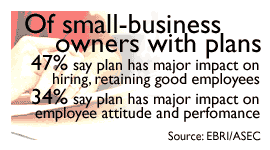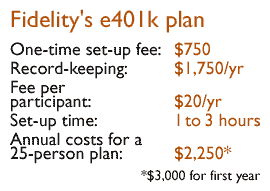|
Push for that 401(k)
|
 |
April 5, 2000: 5:50 a.m. ET
Small firms often lack retirement plans -- which is why you should push for one
By Staff Writer Jeanne Sahadi
|
NEW YORK (CNNfn) - Working for a small company may offer you more opportunity and job satisfaction than a big corporation. But you know you can't stay forever -- unless the benefits improve.
Less than 50 percent of small businesses with fewer than 100 employees sponsor a 401(k) or other retirement plan, according to the Bureau of Labor Statistics. And a survey released this week by the Employee Benefit Research Institute and American Savings Education Council shows many small-business owners are not aware of the variety of plans available to them, and don't think their work force even wants one.
That's why employees can do themselves -- and their bosses -- a favor if they lobby for a savings plan armed with the facts. But think "win-win" before you speak up.
"Have a compelling argument that speaks to the bottom line," said David Wray, president of the Profit Sharing/401k Council of America.
Say, hey, how about a 401(k)?
Put this in your arsenal: sponsoring a 401(k) plan may make the company more successful - and more competitive.
"There are studies that show participants in a 401(k) plans are less likely to leave the company and are better workers," Wray said.
 The EBRI/ASEC survey found that 47 percent of small-business owners who provide a retirement plan have noticed a major impact on their ability to hire and retain good employees, while 40 percent report a minor impact. And 34 percent said the plan has a major impact on employee attitudes and performance, while 49 percent said it has a minor impact. The EBRI/ASEC survey found that 47 percent of small-business owners who provide a retirement plan have noticed a major impact on their ability to hire and retain good employees, while 40 percent report a minor impact. And 34 percent said the plan has a major impact on employee attitudes and performance, while 49 percent said it has a minor impact.
The 401(k) is one of the most desirable retirement plans because it lets you contribute more money -- $10,500 a year - - tax-deferred than any other long-term savings vehicle.
"This is one of the best tax dodges there is," said Scott Faris, director of corporate consulting services for Arnerich Massena & Associates.
And if you work for a small professional firm or tech company, try this argument: Everybody's doing it. Eager to hire the best people, your boss has a vested interest in making you happy. "Employers have to be competitive," Faris said.
Low-cost 401(k)s available
But many small-businesses shy away from the 401(k) because of the administrative expenses, the fiduciary responsibility and costly non-discrimination tests and regulations.
Take the top-heavy rule. If 60 percent of a plan's assets are owned by a company's highly compensated employees -- those who earn $85,000 or more a year -- then the employer must contribute 3 percent of each employee's salary to the plan in addition to any match and regardless of whether an employee participates in the plan, Wray said.
 But a 401(k) need not break the bank, especially if you work for a small business with moderate salaries and a boss who has no intention of matching contributions. But a 401(k) need not break the bank, especially if you work for a small business with moderate salaries and a boss who has no intention of matching contributions.
"The biggest cost is how much the employer contributes," Faris said.
Excluding a match, sponsoring a plan can cost anywhere from $2,000 to $7,000 a year, he said.
Low-cost options will multiply as more 401(k) plans go online. Fidelity's e401k.com, for instance, charges annual record-keeping fees of $1,750 plus $20 per participant. For a 25-person plan, that works out to $2,250 a year.
Plan B
If your boss has decided against a traditional 401(k) because costs or regulations are too difficult to meet, don't give up.
"Tell your boss you're after a tax-effective way to save more," said Dallas Salisbury, EBRI president. "There are enough different options. And there are easy, cheap ways to do it."
One option is a "safe-harbor" 401(k) that lets your boss set up a plan without having to meet the non-discrimination tests, such as the requirement that places limits on how much highly compensated employees can contribute, said Gary Kushner, an employee benefits consultant at Kushner & Co.
The chief downside for your boss is that employer contributions are mandatory and immediately vested, while in a traditional 401(k) they are neither. With a safe-harbor plan, the company must either put in a non-elective contribution equal to 3 percent of each employee's eligible compensation, or offer a dollar-for-dollar match up to 3 percent of your contributions and then 50 cents on the dollar for the next 2 percent of your 401(k) payments, Kushner said.
Another option is a Simple IRA, which allows you to contribute up to $6,000 a year tax deferred -- $4,000 more than a traditional IRA -- and requires your company to make matching or non-elective contributions. But there is no discrimination testing and administration costs are generally less than in a traditional 401(k).
Lastly, you might ask for a SEP-IRA. Employees cannot make contributions to this plan, but the employer must make a non-elective contribution of up to 15 percent of each employee's compensation to employee accounts. The time and cost for administration can be kept low, involving as little as one IRS form and a lump-sum contribution made to everyone's accounts before tax day.
Make it easy for the boss
Since running a small business can feel like a high-wire act without a safety net, managers don't have a lot of time to research plan options.
"Small companies are always right on the edge. (Setting up a retirement plan) distracts the management from their single-minded purpose of getting business in the door," Wray said. "You've got to make it easy for those people."
To that end, you might suggest they visit the Department of Labor's small business retirement program planner and take EBRI's small business retirement quiz. The 401(k) Council of America also offers a 401(k) plan cost disclosure worksheet.
And remember, there's strength in numbers. Before you make your case to the boss, take a poll of your co-workers to see how many would like a retirement program. Forty-nine percent of small-business owners without a savings plan told EBRI that demand from employees would lead them to seriously consider starting one. 
|
|
|
|
|
 |

|

